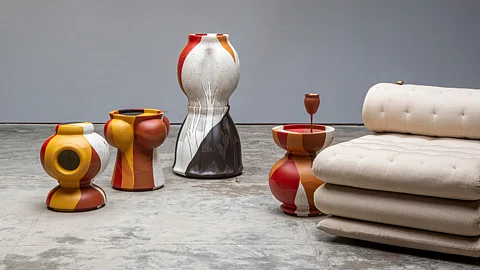
- HOMEGROWN WORLD
- #HGCREATORS
- #HGEXPLORE
- #HGVOICES
- #HGSHOP
- CAREERS
- ABOUT US
- CONTACT US

Brass, terracotta, banana fiber are materials that shape the everyday fabric of India. We see them in temple bells, roadside chai cups, woven charpoys resting in the afternoon sun. They’re familiar, almost invisible in their ubiquity. But what if these materials weren’t just functional relics of tradition? What if they morphed into something surreal, something sculptural — objects that feel like they’ve slipped through the cracks of time, and changed their constitution to fit an imagined future? This is the dreamlike world of Continuum, Gunjan Gupta’s latest collection, where heritage materials transcend their expected forms and become artifacts of a new design language.
For over two decades, Gupta has been redefining what contemporary Indian design looks like. Continuum takes that philosophy a step further, blending craft with functionality in a way that doesn’t just preserve tradition but actively pushes it forward. It is a love letter to India’s master artisans, and a deep meditation on the fluidity of craft. The collection is a dance of materials — brass, silver, leather, indigo-dyed cane, semi-precious stone, and hand-beaten metal, all coming together in unexpected yet harmonious ways. Through the hands of artisans from across the country, the designer has crafted a body of work that holds both beauty and contextual narrative.
Take the Bidar-chitecture Shelving Units, for example. Inspired by the formidable Bidar Fort, they bring together the ancient inlay technique of Bidri with sleek modular storage. The contrast is stunning — blackened metal kissed with silver, historic motifs reshaped into functional design. Similarly, the Bidri Kintsugi Vases marry two philosophies of imperfection: the Indian metal inlay craft of Bidri and Japan’s poetic practice of Kintsugi, where broken ceramics are repaired with gold, celebrating flaws rather than hiding them. In these vases, delicate silver veins trace their way across dark surfaces, giving an impression of fractured light captured in metal.
Gunjan’s playful approach to modularity and stacking; something seen throughout Indian living spaces; finds a fresh form in pieces like The Pot is ‘HER’ Cane Totem Pole Tables. Handwoven cane from Nagaland, dyed in deep indigo, stacks with copper in a way that feels like a contemporary sculpture, while the Phad Totem Pole Tables, hand-painted by Rajasthan’s Kalyan Joshi, reinterpret the five elements of nature through traditional storytelling. These works are sculptural expressions of the ever-evolving language of craft.
Continuum also delves into India’s historic relationship with textiles. The Rafoo Stack is a poetic ode to the dying art of darning, where intricate Jamavar shawl fragments are reimagined into geometric compositions by fourth-generation Rafoogar, Intekab Ahmed. Here, restoration becomes reinvention, highlighting the invisible artistry of repair. Similarly, the Jantar Mantar Recline, inspired by Jaipur’s astronomical observatory, pairs traditional gold leafing with contemporary design, resulting in a striking chair that fuses celestial symbolism with modern aesthetics.
Then there’s the Bartanwala Bicycle Throne — a striking sculpture that pays homage to India’s street vendors. With its throne-like presence, it’s a nod to those who transport entire worlds on two wheels. This piece, made from hand-beaten metal vessels stacked in a way that mimics these mobile shops, transforms an everyday sight into an object of reverence.
More than a collection, Continuum is an act of cultural preservation through reinvention. It doesn’t just honor India’s craft legacies; it insists on their relevance. By working with master artisans and bridging their skills with contemporary design, Gupta ensures that these techniques don’t just survive but transform to adapt to the new age.
Follow Gunjan here.
